In which the beleaguered reviewer attempts to make some headway into the mounds of CDs seeking reviews accumulating daily by providing quick hits on a few recordings at a time.
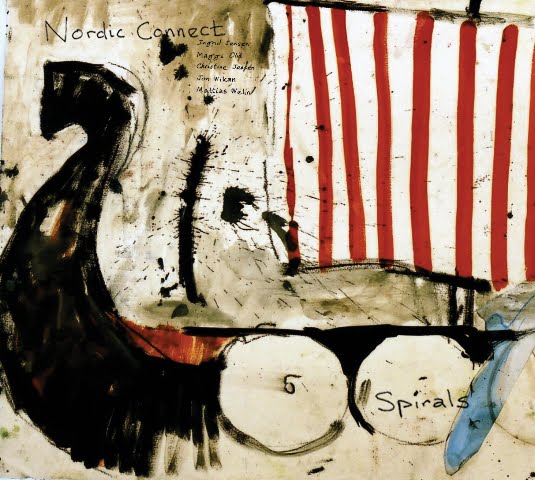 Nordic Connect - "Spirals"
Nordic Connect - "Spirals"
(Artist Share)
Nordic Connect's new fan-funded ArtistShare release Spirals probes the depths of postmodern jazz without sacrificing melody on a burning pyre. Nordic Connect is comprised of sisters Ingrid (trumpet, flugelhorn and electronics) and Christine (alto and soprano saxes) Jensen, keyboard player Maggi Olin (who wrote five of the nine numbers), Ingrid's husband Jon Wikan on drums and Swedish bassist Matthias Welin. This talented Norse configuration launches immediately into the sunny, Olin-penned "Travel Fever" that showcases the natural affinity between the three female soloists, as they are supported by their male rhythm section. Ingrid sparkles brightly on another strong Olin offering "Song for Inga," and her intensity is matched by Christine's rebuttal on soprano sax. How pleasant, indeed, it is to hear serious, mature "grown up" music with an emphasis on songs and arrangements and featuring the band members actually listening to one another, and it is like a welcome rush of air from the north wind to hear these players working in sync as they do. Ingrid pitches in next with "Earth Sighs" a somewhat looser number with electric piano and funky bass that sounds like '70s' Miles. Meanwhile, Christine's delightful "Castle Mountain" takes the Viking ship to the Ivory Coast, where the raucous action includes solos by Olin (again on electric piano) and Christine on soprano and some stellar drumming by Wikan. Ingrid's bold solo on another excellent Olin piece "M-Oving" is followed by some outstanding acoustic piano, while Christine spirals around in harmony and Wikan and Welin provide the percolating rhythm beneath. Perhaps the highlight of the record is "Yew" a lovely waltzing ballad from Christine with superb and highly sensitive playing and band interplay. Wikan contributes the rhythmic "66 Mike" before the album ends with two more Olin compositions: the stately "Ballad North" and cunningly-titled "Brejk a Leg," which showcases Ingrid's electronic explorations on a heart-racing finale. Fans should certainly enjoy sitting at the table for this tasty musical smorgasbord.
www.ingridjensen.com/
Chris Siebold's Psycles - "Live at Martyrs'"
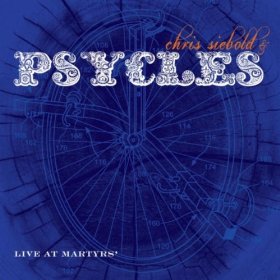 Guitarist Chris Siebold has been an exciting presence on the Chicago jazz scene for several years now, displaying his impressive talents as a member of a plethora of ensembles, perhaps most notably with harmonica virtuoso Howard Levy; the M13 big band; as well as with the popular group, the high-octane Kick the Cat. On Live at Martyrs' (recorded at the North side's popular club) Siebold's group Psycles showcases Siebold's wide range of musical interests, exhibited in the eclectic song choices and styles, as well as by the intriguing cast of musicians that include the aforementioned Levy, clear-toned vocalist Ingrid Graudins, local standouts Jon Deitemyer (drums), Ben Lewis (keys) and Bob Garrett (percussion) and several fellow members of M13. Judging by his ubiquity on the scene, you might think that the young man is strictly a jobber for hire, but it is clear that Siebold has a deep appreciation for many forms of music and has never been content to constrict his abilities to only one genre.
Guitarist Chris Siebold has been an exciting presence on the Chicago jazz scene for several years now, displaying his impressive talents as a member of a plethora of ensembles, perhaps most notably with harmonica virtuoso Howard Levy; the M13 big band; as well as with the popular group, the high-octane Kick the Cat. On Live at Martyrs' (recorded at the North side's popular club) Siebold's group Psycles showcases Siebold's wide range of musical interests, exhibited in the eclectic song choices and styles, as well as by the intriguing cast of musicians that include the aforementioned Levy, clear-toned vocalist Ingrid Graudins, local standouts Jon Deitemyer (drums), Ben Lewis (keys) and Bob Garrett (percussion) and several fellow members of M13. Judging by his ubiquity on the scene, you might think that the young man is strictly a jobber for hire, but it is clear that Siebold has a deep appreciation for many forms of music and has never been content to constrict his abilities to only one genre.
Siebold seems to follow his own path, one that seems to take its course from Duke Ellington's famous quote about there being only two kinds of music: good or bad. So, despite having enough "jazz" elements in the works, listeners will find folk, rock and blues involved, case in point, the opening Siebold original, (and cheekily-titled) "Form Letter to God," which combines almost-classical soprano saxophone and trumpet flourishes (from M13'ers Aaron McEvers and Aaron McEvers respectively) with a tasty Frank Zappa-flavored guitar solo in the middle-section. The strength of this number is repeated in "Dialogue" (cowritten by Siebold with bassist Larry Kohut) -- a tour de force composition that offers pianist Lewis first spot in the solo spotlight. When McEvers follows this with a burning tenor sax solo, you realize that another of Siebold's strengths as a bandleader is to choose the right musicians and give them opportunities to shine. Mention must also be given to the fine rhythm section on this number: bassist Tim Fox's gnarly lines combine with Deitemeyer and Garrett to provide strong propulsion on this fusionesque number. Siebold also weighs in with a great solo that hints at John McLaughlin.
"Still" slows things down beautifully, as Graudins takes on the vocals (on a song Siebold cowrote with singer Lisa Roti) initially accompanied primarily by Siebold's sitar-like guitar, before the whole band kicks in, and Levy's haunting harmonica. Siebold also dips heavily into the canon of former Bill Bruford's Earthworks bandmates, saxophonist Iain Ballamy and keyboardist Django Bates. The former's jangly, up-tempo and Brazilian-flavored "Recedar" brings high-spirits and several fine solos from Lewis, McEvers and Paul Mutzabaugh, while Bates' "Ikebana" features an African atmosphere with Cord's trumpet floating above the sensitive band interaction before Siebold kicks a high-powered guitar solo into the stratosphere -- Levy's mouth harp bringing things slowly back to the earth. Siebold shows his softer folk/bluegrass side with some stellar fingerpicking and Graudins supplying crystalline vocals on their cowritten "Believe" -- accompanied only by Levy--before finishing up with another Ballamy number, "Meadow," (is that an accordion, we hear?) which gives this talented group and their leader one last triumphant march on this satisfying release. Siebold and his Psycles group members have given us an enjoyable and multi-faceted musical outing for lovers of all good music.
The Psycles CD release will be at Martyrs' on March 21
www.psyclesmusic.com
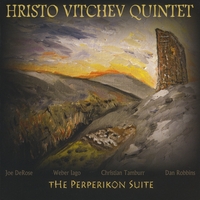 Hristo Vitchev - "The Perperikon Suite"
Hristo Vitchev - "The Perperikon Suite"
(First Orbit Sounds Music)
The ancient region of Thrace existed in an area in Southeastern Europe which is now within the borders of Bulgaria, Greece and Turkey. Famous in Greek and Roman literature, the Thracians gave the world the first rock star (Orpheus), the immortal rebel slave Spartacus, as well as the origin of atomic theory (through the philosopher Democritus). The Thracian capital city of Perperikon still exists in a massive complex of ruins -- the largest such complex in the Balkans -- located in the Eastern Rhodopes mountain range. It is believed that Perperikon was a holy site where a shrine to Sabazios (known in Greece as Dionysis) was located. Bay Area-based, Bulgarian-born guitarist Hristo Vitchev was so inspired by a visit to the ruined city, that he composed this impressionistic suite -- which was premiered to considerable acclaim at the 2010 Monterey Jazz Festival. For the recording, Vitchev and his excellent quartet: Latin Grammy-nominated pianist Weber Iago, bassist Dan Robbins and drummer Joe DeRose, were joined by Christian Tamburr on vibes. The new songs are the strongest Vitchev has written yet, and the addition of Tamburr serves to take the music to an even higher level.
The suite is comprised of seven compositions inspired by locations within the capita complex, beginning with the opening number -- the epic (12:47) "The Stone Passage" that refers to the road entering the city that is cut through the rock at the top of a hill. The mood shifts between thunderstruck awe ("The Stone Passage," "The Shrine of Dionysis") to mysterious ("The Great Hall") to sunny ("The Palace") to frantic ("The Acropolis") to majestic ("The Northern City") to poignant ("The Southern City") -- with elements of all the emotions Vitchev experienced present in most of the songs, and his longtime band plus one is clearly in tune with the musical imagery Vitchev wants to convey.
Robbins produces a rich, deep tone from his bass -- both with his fingers, as well as with a bow--that provides a solid earth tone to the band's naturalistic musical palette and he offers several fine solos. DeRose is a drummer who combines intelligence with sensitivity in his playing, while Tambur is a former DownBeat Magazine college award winner who boasts a wide range of experience around the globe (he is currently a musical director for Cirque du Soleil) whose deft touch brings new colors and energy to the group. Iago, meanwhile is a brilliant performer on the piano who matches his bandleader's feel with both energy and a strong melodic drive. Vitchev, meanwhile, continues to impress the listener with his addictive blend of jazz with touches of classical, Brazilian and Eastern European influences in both his playing and songwriting. In lieu of visiting the legendary site yourself, listeners are urged to take a musical journey to the ancient location as seen through the senses of Hristo Vitchev and shared with you through his highly satisfying musical presentation.
www.hristovitchev.com
Bradley Williams - "Sojourn"
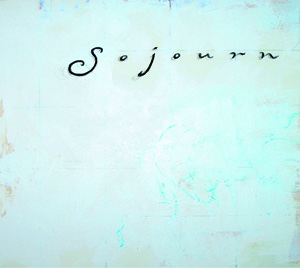 It's swing time with strings as longtime Chicago pianist Bradley Williams presents 12 original tunes performed by his piano trio with a shimmering string quartet on his new release, "Sojourn." Starting things off with a lovely waltz ("Onward and Sideways") featuring cellist Cheng-Hou Lee's long lines, Williams' sparkling piano flourishes and some nifty pizzicato work from fellow quartet members Blaise Magniere and Marie Wang (violins) and Tony Devroye (viola). Williams, a veteran of Woody Herman's bands, as well as teaching at DePaul and serving a long stint as the musical director for the Gold Star Sardine Bar (just part of his impressive resume), has a penchant for stretching himself in sometimes eclectic ways, as in his The Original 21st Century Review, which combines a kaleidoscope of styles, including old time vaudeville. There is a distinct look at the past here as well, with the songs' sweeping romanticism, as on "Bouquet (for Amy)" reminding the listener of the haunting film scores of bygone decades.
It's swing time with strings as longtime Chicago pianist Bradley Williams presents 12 original tunes performed by his piano trio with a shimmering string quartet on his new release, "Sojourn." Starting things off with a lovely waltz ("Onward and Sideways") featuring cellist Cheng-Hou Lee's long lines, Williams' sparkling piano flourishes and some nifty pizzicato work from fellow quartet members Blaise Magniere and Marie Wang (violins) and Tony Devroye (viola). Williams, a veteran of Woody Herman's bands, as well as teaching at DePaul and serving a long stint as the musical director for the Gold Star Sardine Bar (just part of his impressive resume), has a penchant for stretching himself in sometimes eclectic ways, as in his The Original 21st Century Review, which combines a kaleidoscope of styles, including old time vaudeville. There is a distinct look at the past here as well, with the songs' sweeping romanticism, as on "Bouquet (for Amy)" reminding the listener of the haunting film scores of bygone decades.
Bassist Dan DeLorenzo and drummer Mike Schlick are completely in sync in keeping the music grounded in jazz even when the going gets quite ethereal. The action heats up on the delightfully bouncy and swinging "The Stroll" with Williams showing a nice bluesy touch on the keys, ala Horace Silver. The brief "Cul-de-sac" shows Williams familiarity with classical music, while "All the Pretty Flowers" offers Magniere's soaring violin and William's pensive piano over one of the prettiest arrangements of the session. "Gal Costa," meanwhile, takes things in a bright, peppy Brazilian direction and showcases DeLorenzo and Schlick stretching out and a clever string arrangement to boot. After the lovely "Lullaby," Williams shows yet another aspect of his skills on Fanfare, which has a '70s' fusion rhythm feel to it, along with skittering free form string improvisation. Devroye's viola opens "Threnody," a hymn of mourning that shows modern classical touches and whose melancholy moves into a sense of hopefullness. The buoyant and catchy "Some Advice" would not have been out of place in an Astaire or Judy Garland movie, with the trio taking center stage before the quartet hops onboard. Singer Jade Maze makes her appearance on the only vocal number of the set, "I'll Let You Break My Heart Again" a delightful pop tune that again points out Williams' wide-ranging abilities, while the haunting title track ends this unique gem of a recording. Well-played, written and recorded, Sojourn is a compelling and refreshing recording with a strong sense of nostalgia for the days when melodies and strings were the norm, not the exception.
Bradley Williams premieres "Sojourn" live on March 25 at the DePaul University Concert Hall
www.BradleyWilliamsLive.com
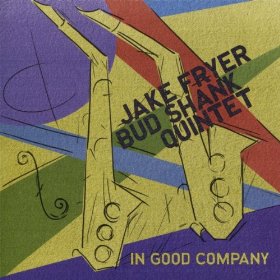 Jake Fryer Bud Shank Quartet - "In Good Company"
Jake Fryer Bud Shank Quartet - "In Good Company"
(Capri Records)
In the spring of 2009, rising British saxophonist Jake Fryer put together a recording session with one of his heroes -- West Coast alto saxophone legend Bud Shank, along with Shank's rhythm section of pianist Mike Wofford, bassist Bob Magnusson and drummer Joe La Barbera. Little did anyone know that the very next day, the veteran would pass away suddenly -- leaving Fryer with the last recording the world would have of the well-regarded Shank. Despite his age (he was nearly 83), the older musician (not unlike Stan Getz), still showed plenty of chops until the end, and this record has the advantage of also helping to pass the torch to a fine younger player in the process. The setlist consists of three covers: "Caravan," "Almost Like Being in Love" and "Speak Low," along with six originals penned by Fryer. Caravan starts off with a resonant bass solo introduction by talented Magnusson before the band, led by Shank, leaps in. While clearly not at the top of his prowess, Shank still exudes passion and creativity to burn. Wofford adds a well-chosen response, while La Barbera sizzles underneath. Fryer meanwhile responds with a solo that seems steeped in Shanks influence and, of course, a drum solo must accompany this oft-covered tune. A true highlight. the original, "Bopping with Bud" follows, giving the band another chance to high-step their way through a delightful bebopping number. Magnusson's walking bass digs a mile-deep groove, Wofford is razor sharp and Shank responds with some strong and inventive soloing. Fryer's reactions to his hero lead to the conclusion that the future of bebop is in good hands with younger players like this chap. Perhaps the centerpiece of the album is the engrossing Latin-flavored "Agnieszka" where pianist Wofford nearly steals the show with his brilliant playing. Both altoists play fine solos here and it is remarkable how similar they sound. Fryer naturally exhibits more strength and sureness of tone, but Shank's exciting ideas shine through and show why he was considered more than just another West Coast player. Lots of loose interplay and blowing on tracks like "Tip Top and Tickety Boo," the well-titled title track "In Good Company" and the funky "Breaking Loose," and it sure sounds like these cats were having some fun in the studio. Meanwhile,"The Time Lord" is a showpiece for La Barbera who gets to cut loose with pyrotechnic results. The chestnuts "Speak Low" and "Almost Like Being in Love" are handled with loving care by Shank and company and the master's emotional solos (especially on the latter) makes it clear that Shank died like we all wish we could -- still doing what he loved best.
www.caprirecords.com
Plunge - "Tin Fish Tango"
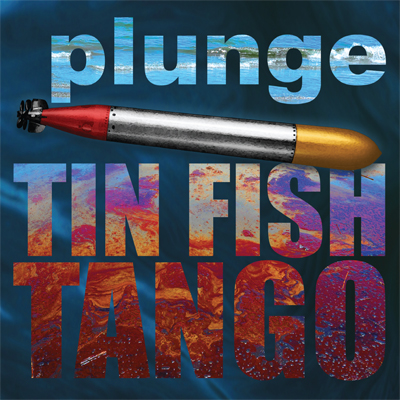 (Immersion Records)
(Immersion Records)
With the spirit of celebration currently emanating from Mardi Gras celebrations down in N'awlins, now seems a good time to take on the latest entry from the trio Plunge who hail from that grand city. Led by trombonist Mark McGrain, Plunge is unique in that it has been (on its last two albums anyway) a drummerless trio. Here, as on 2009's Dancing on Thin Ice, McGrain (who also composes most of the music) is joined by fellow Big Easy stalwarts bassist James Singleton (best known to Chicagoans from Astral Project) and in-demand saxophonist Tim Green. Additionally, Tom Fitzpatrick (Walter "Wolfman" Washington's band) replaces Green on roughly half the numbers, while Dirty Dozen Brass Band sousaphonist Kirk Joseph also appears on two tracks. This is music that could not have come from any other city on earth, and which weaves a mixture of loose improvisation, melancholy funereal aspects and the joie de vivre that defines life in the most unique city in North America. Case in point: the opening title track is indeed a tango, but one like no other--one that is steeped in Spanish moss and Hurricanes, wet brick streets and shadowy courtyards. The presence of this city hangs over the proceedings, while the economy of remaining basically a three-piece allows the intricate strands produced by each member to be heard clearly in the drummerless vacuum. In the hands of lesser players, or ones less immersed in the culture of New Orleans, I suspect the sparse instrumentation may wear thin after a time, but songs like "Bright Side," "Huff-A-Round" (with Joseph "huffing"), "Life Lite," "Big Bhang Theory," "Love's Wildest Talent," "Jugs," and the bluesy "The Kroop" and "Diddlin'" have enough variety to make you want to march down Bourbon Street in a paper crown. There are also three improvisations, but the players are so comfortable playing together you would think they were fully composed. No big band arrangements or flashy solos, just laid back, good-time music featuring strong counterpoint that is strangely addictive. My current personal favorite is the engaging "Strollin' with Sidney" -- a track that truly seems to have captured the multifaceted personality of the musician's city. A pleasing outing for those of us who know what it means to miss New Orleans, as well as those not yet familiar with the gris-gris.
www.plunge.com
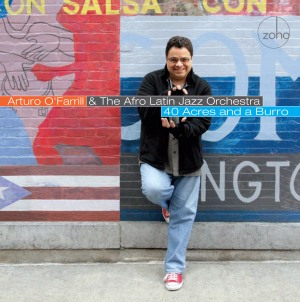 Arturo O'Farrill and the Afro-Latin Jazz Orchestra - "40 Acres and a Burro"
Arturo O'Farrill and the Afro-Latin Jazz Orchestra - "40 Acres and a Burro"
(Zoho)
With a title that cheekily references the fact that O'Farrill's band left its comfortable home at Lincoln Center (where it was regulated as to what was to be played and the number of concerts performed in a season) 3-1/2-years-ago for the freedom (and uncertainty) of life as a non-profit, the Latin superstar's latest album is yet another powerhouse offering of great Afro Latin jazz. Hot on the heels of exceptional releases Song for Chico and Risa Negra, this band has clearly positioned itself as one of the finest in the genre working today and includes top-flight players like trumpeter Jim Seely and saxophonists Bobby Porcelli (alto) and Ivan Renta (tenor) among many others, along with a rhythm section to die for. Adding to the glossy, yet exciting sound is a strong guest list of exceptional musicians, led by clarinet virtuoso Paquito D'Rivera. O'Farrill has always been an equal opportunity artist and here he explores a wide range of music from across Latin America, as well as a surprising version of the traditional Irish air "She Moves Through the Fair"--perhaps not so unusual given O'Farrill's part-Irish ancestry. A hot big band arrangement of Oscar Hernandez' "Rumba Urbana" starts things off explosively with plenty of snap, crackle and pop and some incendiary solos by Seely, Porcelli, O'Farrill and trombonist Gary Valente. Meanwhile O'Farrill's commissioned piece "A Wise Latina" (written to commemorate the first Hispanic Supreme Court Justice Sonia Sotomayor) moves through several sections and ending in a celebratory rave up.
Arturo's father, Chico's, arrangement of "Abelardo Valdes" is a truly hard-charging and swinging highlight, with a supersonic trumpet solo by Seneca Black. D'Rivera makes a welcome appearance on the great Brazilian composer Pixinguinha's choro "Um a Zero" and his dancing clarinet against the saxophone section is a delight, as is Guilherme Monteiro's laughing guitar. O'Farrill's love of Peruvian music is indicated by the inclusion of Gabriel Alegria's "El Sur"--complete with Yuri Juarez on guitar, Seely on another great solo and Freddy "Huevito" Lobaton on a range of traditional percussion instruments. Also, listen for O'Farrill's brilliant percussive yet melodic piano playing here and throughout. Longtime associate, saxophonist David Bixler arranged "She Moves Through the Fair" and his wife, Heather Martin Bixler's violin is central to the number. O'Farrill's cascades of notes (in tribute to Chuco Valdes) open up the heartfelt and complex original composition "Ruminaciones Sobre Cuba," before the proceedings move back farther south with tasty arrangements of Argentinean Astor Piazzolla's "Tanguango" and Brazilian Hermeto Pascoal's "Bebe," the former with Hector Del Curto on bandoneon and the latter with D'Rivera returning. Despite the importance of Dizzy Gillespie's "A Night in Tunisia" to the history of Latin jazz, my initial thought was that another recorded version was unnecessary, however Michael Phillip Mossman's pleasing arrangement changed my mind. The tongue-in-cheek title track (another O'Farrill original) ends this solid album on a strong note with an entertaining composition that combines burro sounds, mariachi cliches, a sung refrain and some utterly exciting ensemble writing to present his personal musical utopian vision.
www.arturoofarrill.com
www.afrolatinjazz.org
The O'Farrill Brothers - "Giant Peach"
 (Zoho)
(Zoho)
The O'Farrill brothers (Adam - trumpet, Zack - drums) are sons to Arturo and grandsons to Chico, so there is no questioning their bloodlines in the world of Afro Cuban jazz, but also don't think their debut record is simply the result of nepotism: as they showed on Arturo's "Risa Negra," these young men can really play. The siblings are joined here by fellow young artists Livio Almeida on piano, bassist Michael Sacks and pianist Zaccai Curtis, on a recording written primarily by Adam, with one track apiece supplied by Almeida and Sacks and one cover (Benny Golson's "Stablemates"). The Golson track, here arranged in an unusual 15/4 time signature, opens things and immediately you are aware that this is not your usual high school recital -- there is some serious talent afoot here amongst the baby faces. Adam O'Farrill and Almerida trade sizzling solos, while the rhythm section, especially the cymbal-happy Zach, percolates with serious energy underneath. Almeida's "Face It" is driven by Sacks' impressive bass and offers an adventurous piano solo from Curtis, as well as fireworks from Almeida and Adam O'Farrill. Adam's title track shows the depths and maturity of the young man's compositional skills, on a strong effort that surely must have the old man smiling. Sacks pitches in with the 7/4 blues "Side Street," while Adam supplies the last four numbers. "The Composing Process" is a study for jazz quintet that again points to a bright future for the young composer, with intricate lines and energetic band interaction. And it is apparent that Adam has been listening to his dad and grandfather and has absorbed lessons to build upon. "Happy Hours" (hopefully these clean cut young men are not speaking about the bar) features a nice bass solo from Sacks, while "Crazy Chicken" gives Curtis, Sacks and Zack the spotlight turn. The album ending "Afterwalk" is a groove-laden, foot-stomper in the Freddie Hubbard vein. Giant Peach is as smart and serious as it is fun and full of youthful exuberance; clearly, the future of Afro Latin jazz is in good hands with this latest generation of O'Farrills.
http://ofarrillbrothers.com/
